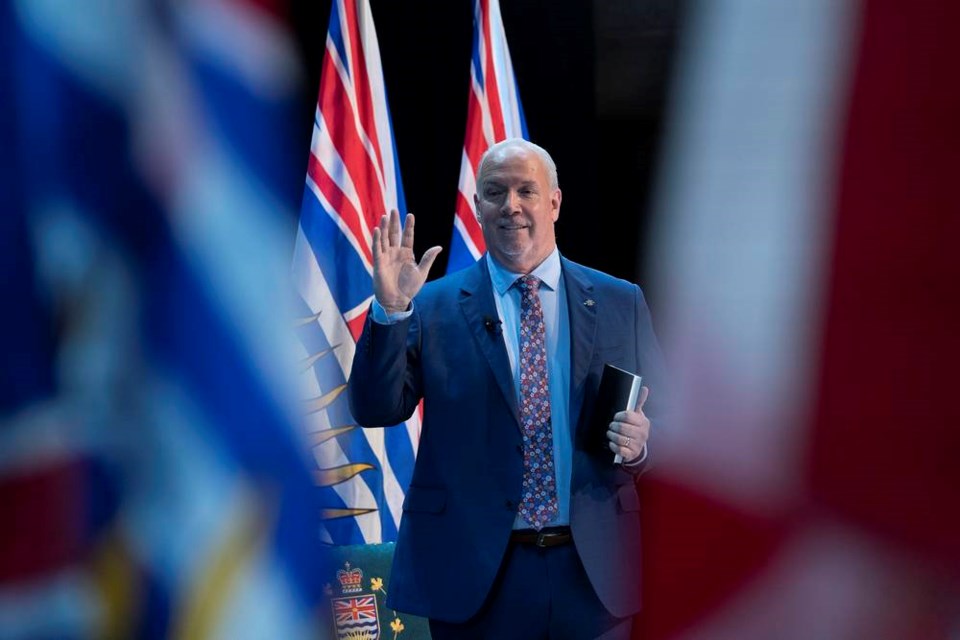The COVID-19 count crashed Premier John Horgan’s party on Thursday, reminding everyone yet again there is only one political issue in this province.
Just as his new cabinet ministers finished reciting their oaths and signing their pledges, the latest count was released.
Another 887 cases were reported in one day — the highest jump yet — bringing the provincial total to almost 30,000. To the limited extent that officials had any control over this situation, it’s clear now they are losing it.
Even before the latest count was released, Horgan told the ceremony there is little chance that the pandemic, now in its ninth month, will recede in the short term.
He said the only way to get through this is by following “the good science and … advice from public health officials … to care for one another, to be kind and to be safe.” That message has been delivered every single day since near the start of 2020, but it’s obviously no longer effective.
Moments after he cited the loss of 371 lives to COVID-19, 13 more were added to the death toll.
With 7,899 active cases and more than 10,000 being monitored for exposure, the stunning surge that coincided with the election call that led to the new cabinet swearing-in is the dominant issue in all their new briefing books.
More specifically, the newly constituted cabinet will have to grapple with the fact that collective behaviour has a lot more impact on how the virus progresses than anything the government can come up with, short of a vaccine. The various edicts on social behaviour seemed to work in the early going, but even with some recent adjustments, they are no longer effective.
There are seven new faces at the cabinet table, but it’s still just the same three that will be front and centre when it comes to the worsening crisis: Horgan, Health Minister Adrian Dix and Public Safety Minister Mike Farnworth, with provincial health officer Dr. Bonnie Henry as the medical lead.
Well in the background will be the newcomers who, with some juggling of titles, replace assorted retirees. The most obvious hole in the lineup was left by Carole James’ retirement as finance minister. Selina Robinson, who was responsible for the housing push, replaces her, but James will carry on as a $1-a-year special adviser to the premier.
Horgan managed to pick 23 ministers and ministers of state from 57 caucus members without leaving out anyone from his previous cabinet. Thirteen first-term ministers will carry on, seven of them in the same portfolios, some of which are adjusted slightly. The first-term ministers who were shuffled include Rob Fleming, who moves from education to transportation.
Horgan rejected any suggestion that it reflected any unhappiness. But B.C. schools have a lot of tension, uncertainty and anxiety about how to function during the pandemic and now there’s a new minister (ex-Hospital Employees’ Union head Jennifer Whiteside) who has to deal with it.
Vancouver Island retains its clout with six ministers, including that slot at the head of the table.
But three regions are largely left out in the cold — the north, the east and the Interior.
With only five MLAs outside the south coast proper, Horgan could find room for only one full-fledged cabinet minister from the entire mainland north of Hope. It’s veteran Katrine Conroy (Kootenay West), who now heads a Forests, Lands and Natural Resources Ministry that is about to be broken up and reconstituted.
Former federal MP Nathan Cullen (Stikine) will assist her in a junior minister of state capacity.
Four of the seven new cabinet ministers are also first-term MLAs, led by Oak Bay-Gordon Head’s Murray Rankin, in Indigenous relations and reconciliation.
Opposition Liberals extended their best wishes and will face off against the new cabinet on Dec. 7. All three parties have endorsed the co-operation and unanimity that highlighted proceedings over the year.
Horgan said he has great respect for interim opposition leader Shirley Bond and thinks it’s mutual. She’ll criticize where warranted, he said, but will be quick to support where required.
But it’s an open question if that striking single-mindedness that lasted until he called the October election will last, given that the approach they all endorsed and supported looks to be failing.



